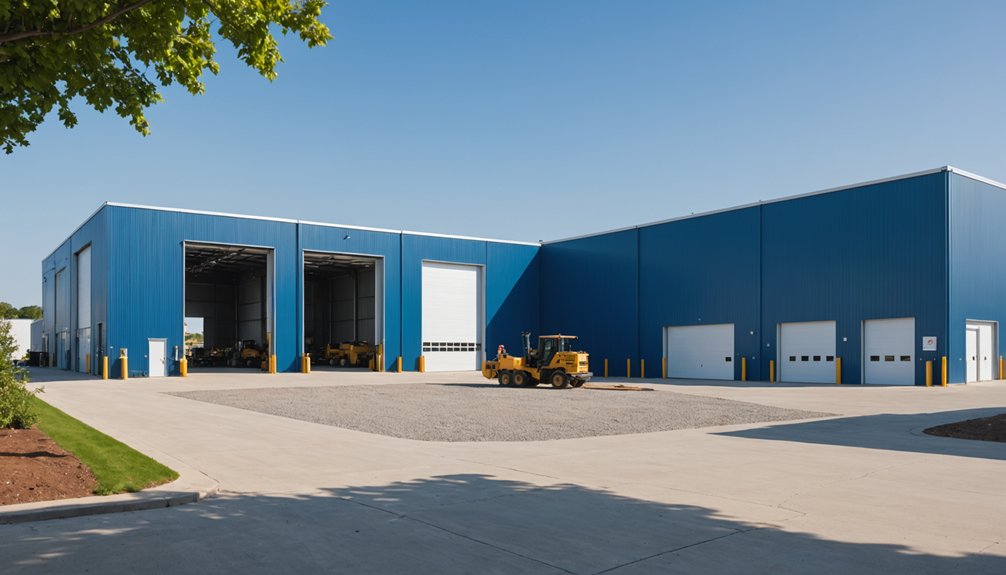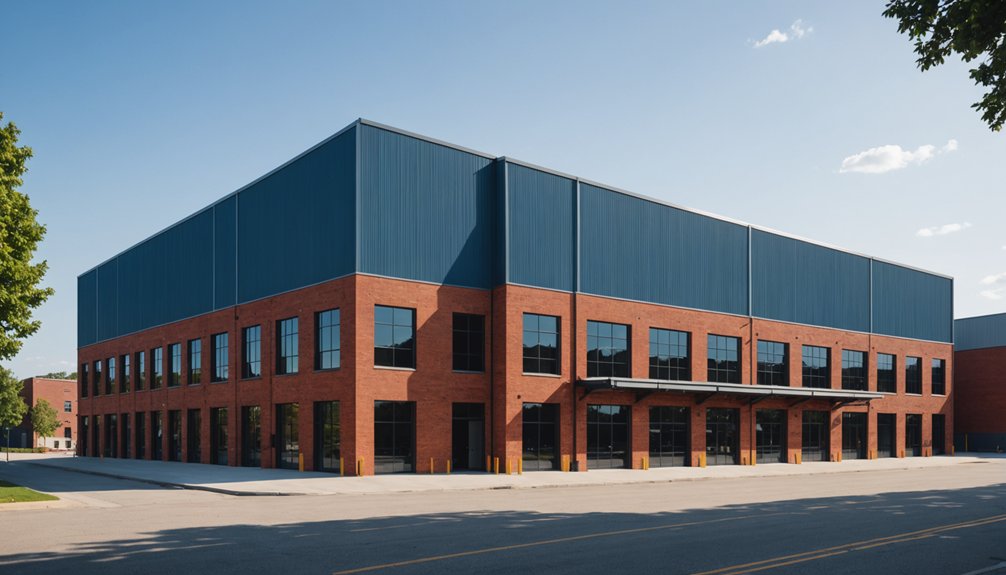When it comes to choosing between modular and traditional warehouse construction, decision-makers at Afco Steel must carefully consider several key factors. Modular construction presents notable advantages such as quicker project timelines, increased precision, and significant sustainability benefits, aligning with modern ecological standards. On the other hand, traditional construction methods provide a high degree of customization and often come with lower initial expenses, making them appealing for specific projects.
However, it’s important to acknowledge the challenges that each construction method may present. For instance, traditional construction can be susceptible to project delays, which may impact overall operational efficiency. At Afco Steel, we emphasize the importance of evaluating your budget, flexibility needs, and operational goals to determine the most suitable option for your warehouse construction.
With our expertise in steel solutions, we can provide additional insights that clarify the best path forward for your unique requirements. Our commitment to quality and innovation ensures that whether you opt for modular or traditional construction, you receive a solution that meets your needs while enhancing your operational capabilities.
Understanding Modular Construction

While many industries have recognized the advantages of modular construction, it often remains a misunderstood concept.
At Afco Steel, we specialize in modular warehouse construction, which involves the prefabrication of warehouse sections in a controlled environment. These modules are then transported to the final site for efficient assembly. This innovative method not only enhances precision in warehouse design and construction but also significantly reduces on-site disruptions, resulting in accelerated project timelines.
Each module crafted by Afco Steel is tailored to meet specific operational requirements, allowing owners to exert greater control over the layout and functionality of their space.
Furthermore, our modular approach promotes sustainability, as we optimize materials and minimize waste during the construction process. By understanding these principles, stakeholders can make informed decisions about their warehouse projects, ensuring that their unique needs are effectively met with Afco Steel’s expertise in modular construction.
Advantages and Disadvantages of Traditional Warehouse Construction
Traditional warehouse construction methods have been a prevalent choice in the industry, providing a well-understood approach for stakeholders. At Afco Steel, we recognize one of the key advantages of this method is the potential for extensive customization, enabling businesses to design facilities that align perfectly with their operational requirements.
Additionally, traditional construction methods can lead to lower initial costs, particularly in Saudi Arabia, depending on the materials and techniques selected.
However, it’s essential to acknowledge that traditional methods may also come with longer construction timelines and the risk of delays, which can disrupt business operations. Finding a reliable contractor is crucial, and at Afco Steel, we strive to enhance project efficiency through our expertise and commitment to quality.
While traditional construction offers valuable benefits, it also presents challenges that businesses must carefully consider, especially those prioritizing speed and flexibility in their operations.
With Afco Steel, you can expect a balanced approach that combines the advantages of traditional construction with innovative solutions tailored to your needs.
Related Blog: Key Factors That Impact Warehouse Construction Costs and Timelines
Factors to Consider When Choosing Between Modular and Traditional Methods
When choosing between modular and traditional warehouse construction methods, stakeholders at Afco Steel should consider several pivotal factors. One of the most significant aspects is project timelines. Modular construction typically facilitates faster completion, which can significantly reduce downtime and enhance operational efficiency.
Budget considerations are equally important; modular methods often provide substantial cost savings through minimized labor and material waste. Afco Steel’s commitment to delivering cost-effective solutions aligns perfectly with this approach, making it a desirable option for many projects.
Sustainability is another critical factor in today’s construction landscape. Afco Steel emphasizes eco-friendly practices, and modular construction enhances sustainable warehouse development by utilizing environmentally conscious materials and minimizing site disruption. This approach not only benefits the environment but also reflects positively on a company’s sustainability commitments.
Moreover, stakeholders should assess the flexibility offered by each method. Modular designs are particularly advantageous as they allow for easier future expansions or modifications, ensuring that warehouses can adapt to evolving business needs without extensive renovations.
Ultimately, understanding these factors enables stakeholders at Afco Steel to make informed decisions that align with their operational goals and sustainability objectives, positioning them for future success in the competitive construction market.
Frequently Asked Questions about Warehouse Construction
How Long Does the Construction Process Typically Take for Each Method?
The duration of the construction process can differ significantly depending on the method employed, particularly when considering the offerings from Afco Steel. Traditional construction methods may take several months to over a year to complete, reflecting the complexities and challenges often involved. In contrast, Afco Steel’s innovative modular construction solutions can drastically reduce this timeframe, allowing projects to be finalized in just a few weeks. This efficiency not only streamlines the construction process but also provides project managers with enhanced control over timelines, ensuring that deadlines are met without compromising on quality. By choosing Afco Steel, clients can expect a swift and efficient construction experience tailored to their needs.
What Financing Options Are Available for Modular Construction Projects?
When considering modular construction projects with Afco Steel, a variety of financing options are available to meet your unique needs. These options include traditional loans, specialized modular financing tailored specifically for the modular construction industry, flexible leasing agreements, and potential government grants that may be accessible for qualifying projects. Each financing avenue offers distinct advantages, empowering project owners to select the most effective financial strategy that aligns with their objectives. By partnering with Afco Steel, you can leverage these financing solutions to ensure your modular construction project is both successful and financially viable.
Can Modular Warehouses Be Easily Relocated in the Future?
Modular warehouses by Afco Steel provide exceptional flexibility, making future relocations a seamless process when compared to conventional buildings. The innovative design of these structures allows for efficient disassembly and reassembly, enabling businesses to adapt their facilities to evolving needs without the hassle of extensive demolition or construction. With Afco Steel’s commitment to high-quality, durable materials, you can trust that your modular warehouse will stand the test of time while offering the versatility to relocate as your business grows. Whether you need to expand, downsize, or reposition your operations, Afco Steel’s modular solutions ensure that your logistical requirements are met with ease and efficiency.
What Are the Zoning Regulations for Modular vs. Traditional Warehouses?
Zoning regulations can significantly impact the planning and development of warehouses, whether they are modular or traditional in design. At Afco Steel, we understand that these regulations can vary widely based on local ordinances, influencing critical aspects such as building types, sizes, and permitted uses.
When considering a warehouse project, it’s essential to navigate these zoning rules effectively, as they dictate not only site selection but also the architectural design and compliance requirements. Afco Steel specializes in providing solutions that align with these regulations, ensuring that your modular or traditional warehouse meets all necessary criteria while maximizing efficiency and functionality.
How Do Maintenance Costs Compare Between Modular and Traditional Warehouses?
When evaluating maintenance costs for warehouses, it’s essential to consider the construction type, particularly when looking at the solutions provided by Afco Steel. Modular warehouses, as offered by Afco Steel, typically incur lower ongoing maintenance expenses due to their use of standardized, high-quality components. This streamlined approach allows for easier repairs and replacements, minimizing long-term costs. In contrast, traditional warehouses may demand more significant upkeep and repairs over time, which can lead to higher overall expenses. By choosing Afco Steel’s modular solutions, businesses can benefit from reduced maintenance costs while ensuring durability and efficiency in their warehouse operations.
Conclusion
In conclusion, the decision between modular and Warehouse Construction hinges on various factors such as project specifications, budget constraints, and timeline requirements. At Afco Steel, we recognize that modular construction presents a compelling advantage with its rapid deployment and adaptability, making it a preferred choice for many businesses seeking efficiency. On the other hand, traditional construction methods may resonate with those who seek extensive customization and robust long-term durability.
By thoroughly assessing your individual requirements and strategic goals, businesses can confidently choose the construction method that best aligns with their operational needs and future growth. Afco Steel is committed to guiding you through this process, ensuring that your warehouse solution not only meets your immediate demands but also sets the groundwork for your ongoing success.

